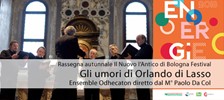Oalì Oalà

| Compositore | Stefano Savini |
|---|---|
| Esecutore | NOPOP |
| Data esecuzione | 14/07/2004 |
| Luogo esecuzione | Cesena (FC) |
| Etichetta | SiltaRecords |
| Produttore | S.S/S.R |
| Data di pubblicazione | 2005 |
| Genere | Jazz |
| Provenienza | Stefano Savini |
This is another excellent release from the relatively new Italian label Silta. The label is strongly committed to supporting contemporary jazz and improvised music both in Italy and beyond. Long may they continue to do so. Nopop is a young sextet that appears to be led by bassist Stefano Ricci who arranges the eight compositions of this all-original programme. Ricci shares the compositional reigns with guitarist Stefano Savini. They each contribute four tunes to the album. Both are excellent writers and their compositions are full of good ideas that are well served by a highly talented band. In addition to the composers the band consists of Gian Maria Mattelicci (clarinet, bass clarinet, piccolo), Massimo Zaniboni (tenor and soprano saxes), Guido Facchini (piano) and Mauro Gazzoni (drums). The album gets off to a spirited start with Ricci's tune "L'Airone". I'm not going to guess at the meaning of any of the titles but this is a busy piece full of changes in mood and tempo. At times it tumbles helter- skelter in an approximation of circus music. By contrast there is Facchini's quiet piano interlude. Zaniboni contributes a gruff tenor solo before the track's swirling climax. It's a real roller coaster ride and shows off the group's instrumental capabilities.
Savini's "Dimal" brings about a complete change of mood. Sombre, pensive and unhurried it unfolds slowly commencing with the composer's undulating guitar chords before the piano picks up the melody. Zaniboni's delicate soprano takes over and Ricci's low register bass and Gazzoni's brushes are added to the mix. Ricci is also featured on bowed bass and Mattelici's bass clarinet also features strongly. There are no conventional jazz solos as such. This is very much a mood piece and is a fine example of ensemble playing and atmosphere building. Savini remains in the composer's chair for "Gabani" which begins with a brief passage of free improvisation before lurching into an off kilter folk influenced theme. A more conventional jazz feel accompanies Zaniboni's big boned tenor solo but the rhythms are complex and test out Ricci, Gazzoni and Facchini the latter taking an agile solo. Mattelicci features when the folk theme returns. Like the opener it's clever stuff, full of ideas and twists and turns but it's a thrilling ride and never gets boring or difficult. Ricci's "Biancospino" has a relaxed vibe that seems to take in folk and Middle Eastern elements. Mattelicci's clarinet states the theme and he is well supported by his colleagues especially the inventive drumming of Gazzoni. Savini contributes a loping guitar solo. The whole piece is airy and lovely and I would guess that it's based on a folk dance. "Il Sorriso Delle Finistere" is also written by Ricci. This is his mood piece and it shares many of the qualities of "Dimal" .It builds slowly beginning with sparse piano and also features arco bass. More solo space is allowed here but without ever breaking the mood of the piece. Facchini plays a brief and elegaic solo and Ricci's sonorous bass is suitably melancholy. The ensemble playing is characteristically excellent.
Savini resumes the composer's duties on the lengthy "Oali Oala" which again has a folksy almost Celtic feel in places. Driven by Gazzoni's powerful but inventive drumming and Zaniboni's passionate tenor it soon finds it's way to other territories. Mattelicci provides an atmospheric unaccompanied clarinet interlude that again hints at the Middle East. As a whole the piece has an episodic, cinematic quality to it and it certainly seems a lot shorter than it's eleven-minute duration. Ricci's "Saline" is a relatively brief ballad that owes something to the ECM aesthetic. It is paced by Facchini's stately piano and Mattelicci's delicate clarinet. Gazzoni's lightness of touch on cymbals adds much to the atmosphere of the track.
Savini's second eleven-minute epic "Cosmos" closes the album and the music here is suitably wide-ranging and exploratory. Beginning with Ricci's unaccompanied plucking the mood builds through Matelicci's bass clarinet and the chording of Savini. Zaniboni's tenor solo has a haunted quality that sounds as if he's lost in space. Gazzoni's dramatic drumming and the glacial tinkling of the piano provide atmospheric support. Mattelicci upholds the mood backed by superb ensemble playing from his colleagues. Once again there is a cinematic quality to the music. The feeling of making a long and exploratory journey is encapsulated in the music.
"Sestetto" was recorded in 2004 but I have to say it is one of the best albums I've heard this year and that this discovery comes as a very welcome surprise. The writing is of a very high standard and is consistently imaginative and inventive with strong themes and melodies. The two composers are excellent at creating moods and textures and their ideas are superbly interpreted by a sympathetic and highly competent band of young musicians. This is an album of exciting, original and colourful contemporary jazz. Highly recommended.
Silta Records: SR0501
Review by Ian Mann
Commenti
| creato: | mercoledì 28 luglio 2010 |
|---|---|
| modificato: | mercoledì 28 luglio 2010 |
